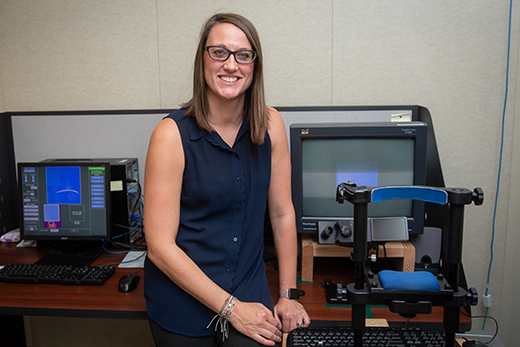Bailey awarded NIH grant to study memory recall in early-stage Alzheimer's patients
Monday, Nov. 7, 2022

Heather Bailey, associate professor of psychological sciences, received a $1.95 million National Institutes of Health grant to study how older adults use prior knowledge to learn and remember new information and to study how the process changes in the early stages of Alzheimer's disease. | Download this photo.
MANHATTAN — A National Institutes of Health grant is helping a Kansas State University researcher explore memory recall in healthy adults and early-stage Alzheimer's disease patients.
Heather Bailey, associate professor of psychological sciences, received a five-year, $1.95 million collaborative grant to evaluate the extent to which older adults use prior knowledge to help them learn and remember new information and whether this ability changes in the early stages of Alzheimer's disease.
"The study looks at how memory for everyday activities changes as we age," Bailey said. "We're interested in what factors explain why older adults often don't remember everyday information as well as they would like. This research will evaluate the differences between young adults, older adults and those who have started to develop dementia."
This grant allows Bailey to continue building on her research on how the brain processes and recalls events and compare that to how Alzheimer's disease alters these processes. The study involves adults watching everyday activities unfold and reporting on their observations while their brain activity is being measured.
"When you see something happen in real life, your brain is mentally representing it at the same time," said Bailey. "We want to know if the quality of somebody's later memory is due to how well they can represent that information while watching it happen."
In addition to the basic understanding of how the brain processes memories in these three groups, Bailey will be testing a memory intervention with Alzheimer's patients. While people are watching an everyday activity, her research team will provide helpful cues that should trigger prior, relevant memories. By doing so, the observer can link the new, incoming information with well-learned information from their past, such as previous times they have brushed their teeth or prepared a cup of coffee.
"With Alzheimer's disease those memories are hard to call up much of the time," Bailey said. "I want to see if adding the intervention cues makes an activity more memorable."
Bailey said if the cues are helpful in memory recall in Alzheimer's patients, occupational therapists, nurses and caregivers could use them to add to the quality of life for dementia patients.
For this project, Bailey is collaborating with Matt Wisniewski, assistant professor of psychological sciences at K-State; Laura Martin at the University of Kansas Medical Center; and Dr. Ryan Townley at the University of Kansas Alzheimer’s Research Center.
Additional support for Bailey’s research was provided by a five-year research project grant from the Cognitive and Neurobiological Approaches to Plasticity, or CNAP, Center for Biomedical Research Excellence.
Community members interested in participating in this study can find more information on eligibility at k-state.edu/memory/older-adults.
